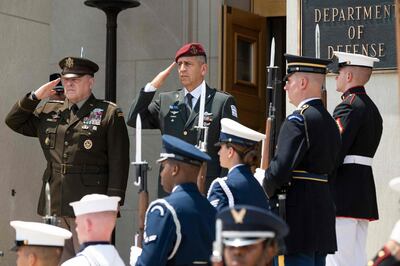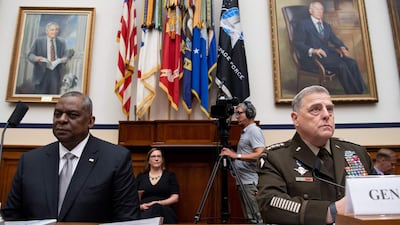It is not often that a senior officer in the American armed forces is said to be politically progressive. But earlier this month, General Mark Milley, Chairman of the Joint Chiefs of Staff and the highest-ranking military officer in the US, was said to be not only progressive, but also responsible for the US military becoming too "woke" – for teaching critical race theory.
If that sounds counter-intuitive about the American army, that's because it is – until one realises that these kinds of accusations are the new normal for some Republicans.
But first, let’s be clear about the situation within the US armed forces when it comes to race. African-Americans have fought as American soldiers in every war the US has ever fought. But until 1948, racial segregation was the norm. On July 26 of that year, former US president Harry Truman ended segregation in the armed forces by issuing an executive order. But while that legally ended open racial discrimination in the armed forces, it did not end racism.
It took more than a decade to enforce the actual integration of servicemen. The problem of racism, however, persists in the US army even to this day. As the Pentagon's spokesperson, Major Cesar Santiago said to the Associated Press last month: "We know that far too many service members indicate they experience discrimination."
And the problem of racism in the armed forces is connected to issues in the wider American society; almost two dozen members of the January 6 storming of the Capitol had links to the US military.
So, the question is not about whether or not racism exists within the American armed forces – that is clearly established. Yet, when General Milley was asked by Florida congressmen, Republicans Michael Waltz and Matt Gaetz, during a House Armed Services hearing, about the teaching of critical race theory, his answer infuriated the two politicians, who insisted that teaching critical race theory would be "divisive". This is a rather peculiar claim.
Simply put, critical race theory is based on the idea that institutions in the US create and sustain inequalities that are economic, political or social inequities between people of colour and white people.

Firstly, as General Milley made clear, there was no indoctrination being promoted by merely teaching critical race theory to cadets. Rather, critical race theory, like many other academic theories, is one of many different approaches to understand the nature of race-relations in the US.
As General Milley elaborated, critical race theory was not being forced as a dogma for trainees to accept; it was merely being taught as one among many theories that exist.
When studying sociology, for example, cadets are taught theories that they might not use or even agree with, but which they ought to be knowledgable about, as they gain an understanding of ideas around which the world works. Presumably, new trainees are taught a variety of diverse concepts, including Marxism or libertarianism. They’re probably taught about multiple religions as well. This does not mean they have to become Marxists or libertarians or follow particular religions. It just means they ought to be educated in those subjects. It is a part of the learning process for students or cadets to broaden their knowledge of the world so as to engage with the people who live by those ideas or beliefs.
Secondly, critical theory in general, and critical race theory in particular, is a specific approach to social philosophy that takes seriously the notion of power structures. One would think that an awareness of that kind of seriousness is important for a cadet in any military service, as also in the military of the most powerful country in the world.
This does not mean that cadets must accept the conclusions of critical theorists. There is much to be argued against, for example, in Jurgen Habaermas’ work in critical theory. But this does not mean that the German philosopher's concerns about the openness of the public sphere are to be dismissed.
Coming back to the Florida congressmen's argument, Mr Gaetz’s objection falls flat when his own approach is considered. When General Milley defended teaching critical race theory to cadets, he explicitly referenced the storming of Capitol Hill, saying: “I want to understand white rage... what is it that caused thousands of people to assault this building and try to overturn the Constitution of the United States of America?“
It is not an unusual thing for General Milley to have said. But when one looks at how Mr Gaetz and many of his Republican colleagues reacted to the storming, one sees the bad-faith nature of the attack in full view. As was widely reported, only days before these hearings, Mr Gaetz suggested the FBI might have "animated" the events on January 6, pushing a discredited conspiracy theory that some on that day were "masquerading as Trump supporters and in fact, were members of the violent terrorist group Antifa."
This controversy is not about the academic flaws of critical race theory, which are open to discussion and ought to be debated, as they have been for decades. Rather, it is the latest front in the right-wing culture war, where merely acknowledging the scale of the problem of racism in America is to be discredited. It would be good if we can simply be honest about that.
Dr HA Hellyer, a Carnegie Endowment scholar, is a senior fellow at the Royal United Services Institute and Cambridge University


